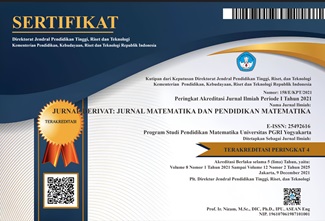Efektivitas Pembelajaran Matematika Dengan Model Quantum Teaching (QT) Ditinjau Dari Kreativitas Belajar Siswa Kelas VIII SMP N 2 Turi
DOI:
https://doi.org/10.31316/j.derivat.v2i2.134Abstract
Penelitian ini bertujuan untuk mengetahui bagaimana efektivitas model kooperatif, efektivitas model Quantum Teaching (QT), dan efektivitas model Quantum Teaching (QT) bila dibandingkan dengan model kooperatif jika ditinjau dari kreativitas belajar siswa.
Populasi dari penelitian semu ini adalah siswa kelas VIII SMP N 2 Turi yaitu VIII A, VIII B, VIII C, dan VIII D. Sampel penelitian adalah VIII B (kelas control) dan VIII A (kelas eksperimen). Instrumen penelitian berupa lembar observasi keterlaksanaan pembelajaran dan tes kreativitas yang sudah diujicobakan (untuk diketahui valid dan reliable).
Uji hipotesis berupa uji proporsi satu populasi dan uji proporsi dua populasi. Berdasarkan uji proporsi satu populasi kelas kontrol diperoleh nilai signifikansi sebesar 0,004 dengan taraf nyata 5% (0,004<0,05) sehingga dapat disimpulkan bahwa model Kooperatif tidak efektif. Sedangkan berdasarkan uji proporsi satu populasi kelas eksperimen diperoleh nilai signifikansi sebesar 0,020 dengan taraf nyata 5% (0,020<0,05) sehingga dapat disimpulkan bahwa model Quantum Teaching tidak efektif. Jika kedua model dibandingkan maka berdasarkan uji proporsi dua populasi diperoleh nilai signifikansi sebesar 0,869 dengan taraf nyata 5% dan dapat diketahui bahwa nilai signifikansi lebih besar daripada taraf nyata (0,869>0,05) sehingga dapat disimpulkan bahwa model Quantum Teaching lebih efektif daripada model Kooperatif.
Â
Kata Kunci: Â Â Â Efektivitas Pembelajaran, Model Quantum Teaching, Kreativitas BelajarDownloads
Published
Issue
Section
Citation Check
License
Authors who publish with this journal agree to the following terms:
-
Authors retain copyright and grant the journal right of first publication with the work simultaneously licensed under a Creative Commons Attribution-ShareAlike 4.0 International License that allows others to share the work with an acknowledgment of the work's authorship and initial publication in this journal.
- Authors are able to enter into separate, additional contractual arrangements for the non-exclusive distribution of the journal's published version of the work (e.g., post it to an institutional repository or publish it in a book), with an acknowledgment of its initial publication in this journal.
- Authors are permitted and encouraged to post their work online (e.g., in institutional repositories or on their website) prior to and during the submission process, as it can lead to productive exchanges, as well as earlier and greater citation of published work (See The Effect of Open Access).







